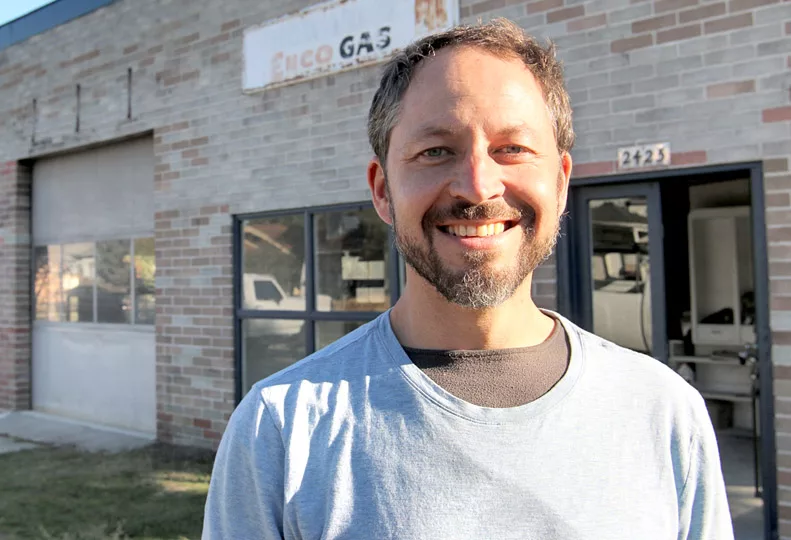
Home » Neighborhood commercial buildings to be revived
Neighborhood commercial buildings to be revived
West Central, Manito areas among those to benefit

October 12, 2017
Kelly Chadwick, owner of Spokane-based Spirit Pruners, says he’s eager to begin the process of working with city planners as he prepares to establish a permanent home for his tree pruning business in a West Central neighborhood.
Chadwick’s effort to find a home for the business got a boost last month when the Spokane City Council unanimously approved a measure allowing older and abandoned buildings that once housed businesses in residential neighborhoods to revert back to commercial uses.
City Council President Ben Stuckart says 90 commercial buildings across the city are located in residential zones. More than half—50—are dormant and dilapidated. The measure was passed with hopes of spurring businesses to move into those buildings to enhance the neighborhoods surrounding them, Stuckart says.
Several neighborhoods, including West Central north of downtown, East Central, Cannon on the lower South Hill, and Manito on the South Hill have high concentrations of commercial buildings located in residential neighborhoods, Stuckart says.
“In my mind, the overarching goal of any community should be what we call 10- to 15-minute neighborhoods. You should be able to walk from your home and be able to eat, shop, or go buy something in 10 to 15 minutes,” he says.
Due to urban sprawl spanning decades now, some neighborhoods have lost a lot of their sense of intimacy, Stuckart contends.
An example Stuckart uses of a successful business in a residential zone is the Rockwood Bakery, at 315 E. 18th, near Manito Park on the South Hill.
“I think everyone that lives around Rockwood, even though they may not appreciate street parking, they appreciate being able to walk to a business,” Stuckart says.
Stuckart says the city previously launched a pilot project that was similar to the citywide measure passed last month and encouraged business owners to establish their operations in vacant buildings in residential neighborhoods.
“We did that pilot just in West Central in 2013, and it never quite took off,” Stuckart says.
But later, in April 2016, Stuckart says he was contacted by George Thomsen, who wanted to start a business in a former commercial building near the South Perry District on the lower South Hill.
“He was actually the impetus of the law,” Stuckart says of Thomsen. “He had to go to (city) planning, and his building was in a residential zone, but he was basically being told he was out of luck.”
Stuckart then went to city planning staff and was told the best way to allow for commercial development in residential zones was to approve a citywide measure resembling the 2013 pilot project in West Central.
Thomsen now is putting the finishing touches on a bakery and restaurant business, Stuckart says.
As for Chadwick, he hopes his business, which will be housed at 2425 W. Broadway, will have a positive impact on the surrounding neighborhood.
The building previously housed a mechanic shop. The previous owners were no longer operating a business there, but were using the space to store old vehicles. The double plot of property also has a single-family residence and outbuilding behind it. In all, the three buildings total 3,600 square feet, Chadwick says.
“I’ve been in business for 5 1/2 years, and I’ve not owned a shop,” Chadwick says of his arborist business. “We’ve grown a lot, and we’re booked out, and things have gone great.”
Chadwick says he’s operated his business in a series of garages he’s owned as well as those belonging to friends before he purchased the Broadway Avenue property last summer.
“I realized what I wanted was a shop in a central area close to town, because I really like being part of the urban milieu,” Chadwick says.
He searched for potential property along Altamont Street, east Sprague Avenue, and in the Hangman Valley neighborhood before finding the West Central location.
“On July 1, I took ownership of it and then we went to work on it,” Chadwick says.
Fittingly, the first thing he and his four employees did was prune overgrown trees on the property.
“We had a work party. I hired some friends who are classical violinists to come in and play. We pruned the trees, had food, and really kind of tripped out the neighborhood,” Chadwick says with a laugh.
In addition to using the building as Spirit Pruners’ home base, Chadwick also plans to renovate the small house on the property and make it his full-time residence.
He removed all of the fencing around the property with the hopes of creating a more inviting environment around the buildings.
“I don’t want it to be a place of fear. I want to get creative and make it inviting and enrich the community,” Chadwick says. “There’s still a ton of stuff to do.”
Latest News Special Report Real Estate & Construction Government
Related Articles
Related Products

_web.webp?t=1769673727)
_web.webp?t=1769673728)
_web.webp?t=1769673735)
